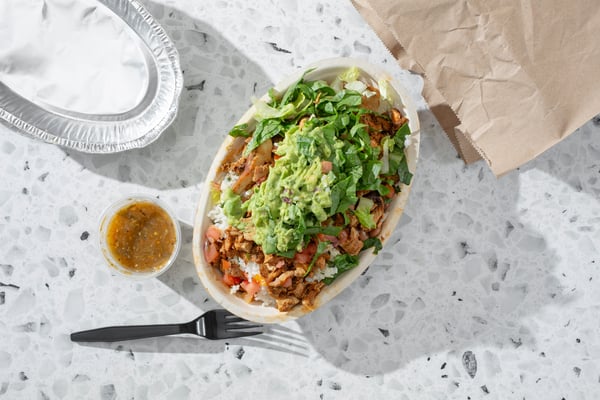Sweetgreen (SG +1.96%), a fast-casual restaurant specializing in salads and grain bowls, attracted a lot of attention when it went public on Nov. 18, 2021. Its stock surged from its IPO price of $28 to $52 on its opening trade, and it closed at its record high of $53 a day later.
At the time, the bulls were impressed by Sweetgreen's strong same-store sales growth and ambitious expansion plans, and it was frequently called the "next Chipotle (CMG +2.36%)." The buying frenzy in growth stocks further amplified its gains and inflated its valuations.
But today, Sweetgreen's stock trades at about $8. Its valuations wilted as its same-store sales growth cooled off, inflation boosted its labor and commodity costs, and it faced tougher competitors. Should investors buy the dip and expect a recovery over the next 12 months?

Image source: Getty Images.
What happened to Sweetgreen after its IPO?
Sweetgreen carved out its niche by selling a broader range of salads and healthier foods than other fast-casual chains. At the time of its IPO, it was serving 1.35 million customers across 130 locations in 13 U.S. states. More than two-thirds of its sales were coming from digital channels. Like Chipotle, it owns and operates all of its stores instead of franchising them. That business model is more capital-intensive, but it gives the company a tighter grip on its brand and operations.

NYSE: SG
Key Data Points
When Sweetgreen went public, its same-store sales were surging, it was opening dozens of new stores each year, and its average unit volume (AUV) -- or the average annual revenue at its stores open for at least 12 months -- was climbing by the double digits. Its high ratio of digital orders also put it ahead of other restaurants, which were scrambling to upgrade their apps.
But over the following years, its same-store sales growth dropped to the single digits. Its new store openings slowed down, its AUV flatlined, and its ratio of digital orders declined. On the bright side, its restaurant-level profit margins still expanded as its growth cooled off.
|
Metric |
2021 |
2022 |
2023 |
2024 |
|---|---|---|---|---|
|
Total Revenue Growth |
54% |
38% |
24% |
16% |
|
New Store Openings |
31 |
36 |
35 |
25 |
|
Same-Store Sales Growth |
25%* |
13% |
4% |
6% |
|
AUV Growth |
20%* |
12% |
0% |
0% |
|
Total Digital Revenue Percentage |
67% |
62% |
59% |
56% |
|
Restaurant-Level Profit Margin |
12% |
15% |
17% |
20% |
Data source: Sweetgreen. *Adjusted for temporary COVID-19 closures in 2020.
Why did Sweetgreen's growth cool off?
Sweetgreen's initial growth was driven by its popularity among office workers in dense urban areas. After the pandemic's height, many of those workers pivoted toward remote work and visited its stores less frequently. It tried to offset that slowdown by expanding into suburbs and smaller cities, but its brand wasn't well-known, and it struggled to grow its sales.
As Sweetgreen's top-line growth decelerated, rising labor and commodity costs -- and a higher mix of lower-margin deliveries -- squeezed its restaurant-level profit margins. However, it offset that pressure by raising its prices and automating its stores with its "Infinite Kitchen" dispensers.
It also directly sourced more of its ingredients instead of going through intermediaries, and it improved the efficiency of its mobile app -- even as its total ratio of digital orders declined. (As it lapped the pandemic, more people returned to its stores, and it expanded into the suburbs, which favored dine-in visits.) Those improvements boosted its restaurant-level profit margins, and its adjusted earnings before interest, taxes, depreciation, and amortization (EBITDA) turned positive in 2024.
Will Sweetgreen's business keep growing?
For 2025, Sweetgreen expects its total revenue to rise 3% to 6%. However, it expects that growth to be entirely driven by "at least" 40 new restaurant openings (with 20 Infinite Kitchen locations) instead of rising same-store sales and AUV at its existing locations.
For the full year, it expects its same-store sales to decline 4% to 6%, its restaurant-level profit margin to dip to 17.5%, and its adjusted EBITDA to drop 20% to 47%. That grim outlook suggests it could fall into the trap of opening new stores to grow its near-term revenue. If those stores don't grow after the first year, they'll continue to reduce its same-store sales. The company attributed that slowdown to macro and competitive headwinds, a difficult comparison to the launch of its popular steak menu last year, and the replacement of its Sweetpath subscriptions with its new SG Rewards loyalty program.
Should you expect Sweetgreen's stock to recover?
With an enterprise value of $803.5 million, Sweetgreen still isn't cheap at 73 times this year's adjusted EBITDA. Chipotle, which anticipates roughly flat same-store sales growth this year as it opens 315 to 345 new locations, trades at just 22 times this year's adjusted EBITDA.
For now, I wouldn't touch Sweetgreen's stock unless it proves its newly opened stores can grow their same-store sales and AUV. If not, the company will get trapped in a nasty cycle of closing its underperforming stores and cutting costs to resize its business -- and its stock could sink even lower before it's considered a bargain.






